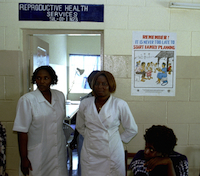Sesay had little choice but to go to the local TBA, Ya Marie, who lives just half a kilometre away from her home. The closest Peripheral Health Unit to her village, Morsondo, is about 20 kilometres away and the nearest hospital is 70 kilometres from the village.
Sesay recounted her traumatic labour with the TBA: "I pushed and pushed but the baby refused to come out.
"Ya Marie said I was not pushing enough so she took a wooden spoon used for cooking and shoved it into my throat, I wanted to vomit. She said that would help me to push harder, she repeated this several times but nothing happened.
"She then shoved her big toe into my anus, still nothing happened. Then she concluded I was very lazy and sat on my chest. She was pressing me down saying this would help push the baby out. The pain was unbearable, I just wanted to die and end it all. I think I fainted."
She was finally taken to the hospital in nearby Moyamba where she delivered a stillborn by caesarean section. "They also had to take out my womb because the doctor said it was no good, the doctors said I was lucky I came out with my life."
Stories like Sesay’s are re-emerging with the resurgence of home births attended by TBAs, who are now excluded from the health system under Sierra Leone’s ambitious free healthcare initiative.
Previously, TBAs worked in the country’s hospitals and clinics, received some clinical medical training and were paid out of fees charged to patients. According to the Health Ministry, the system where TBAs worked in a hospital setting helped reduce maternal deaths as more women were presenting at hospitals and receiving professional help.
The new free healthcare plan for mothers and children has eliminated the user fees that supported TBAs, so they have gone back to practicing alone at home.
The return to unsafe delivery procedures by some TBAs has cost many women their lives. This has contributed to an increase in Sierra Leone’s maternal mortality rate, already ranked among the highest in the world by the United Nations.
Dr Samuel Kargbo, the director for reproductive health care who oversees the implementation of the free health care policy, admitted that the issue of TBAs was a snag in the health care policy.
"We cannot put the welfare of TBAs before the national call for free health care. We knew they relied on the user fees and that as soon as this was tampered with they would return to where we have done everything to take them away from - delivering babies at their houses. But the free health care has to start," Kargbo said.
Kargbo told IPS there is no way the system will continue to accommodate TBAs. "Government will finally discourage the services of TBAs," he stressed.
But many women continue to seek out their services for various reasons, which include ready access, a caring service and low fees, including payment in kind or over time. For Sesay, Ya Marie was nearest to her home. Still, other women prefer the services of a TBA to that provided in a hospital or clinic setting.
"I can easily relate with them. The grannies are experienced women and they show you care and concern. I am just comfortable with them," said Salamatu Turay whose three children were successfully delivered by TBAs.
"We are of great help to women. Our role is unique because we are everywhere were government cannot be. Yet they are always condemning us. Many pregnant women also die in the big hospitals," said Ya Alimamy Sawaneh who delivers babies at her home in Kroo Bay, a slum community in Freetown.
"What they are not seeing and talking about are the many women we help to deliver their babies. They just talk about the ones that were unfortunate to die in our hands," Sawaneh lamented.
Recognising the important services provided by TBAs, some civil society groups are suggesting that they should be trained and allowed to practice.
But Kargbo disagrees. "We have done much training for TBAs and our evaluation reports revealed that those trainings had not contributed to the reduction of maternal mortality in the country.
"They could help in deliveries as much as cats and dogs need help to deliver their young ones. But when there is obstructed labour or other serious issues, the TBAs are useless and they deprive many women of their lives, which would have been saved if they were at a hospital."
However, plans are underway to bring these "Grannies" as they are referred to locally, back to the hospital. Kargbo revealed the availability of a 13 million dollar five-year grant from World Bank which will, among which other projects, be used to support stipend for TBAs who refer their cases to hospitals.
"We want to redefine their roles and strengthen our referral systems, we want to use them as sensitization agents to educate women on vaccines; exclusive breast feeding.
"We could give them malaria diagnostic and treatment kits to help in suburbs where clinics are not present. We want them to help in ensuring that the bed nets we are giving out for free are being used by the mothers and children." Kargbo explained.
source:ipsnews

No comments:
Post a Comment